PPC Management for Pest Control Companies - Full Guide
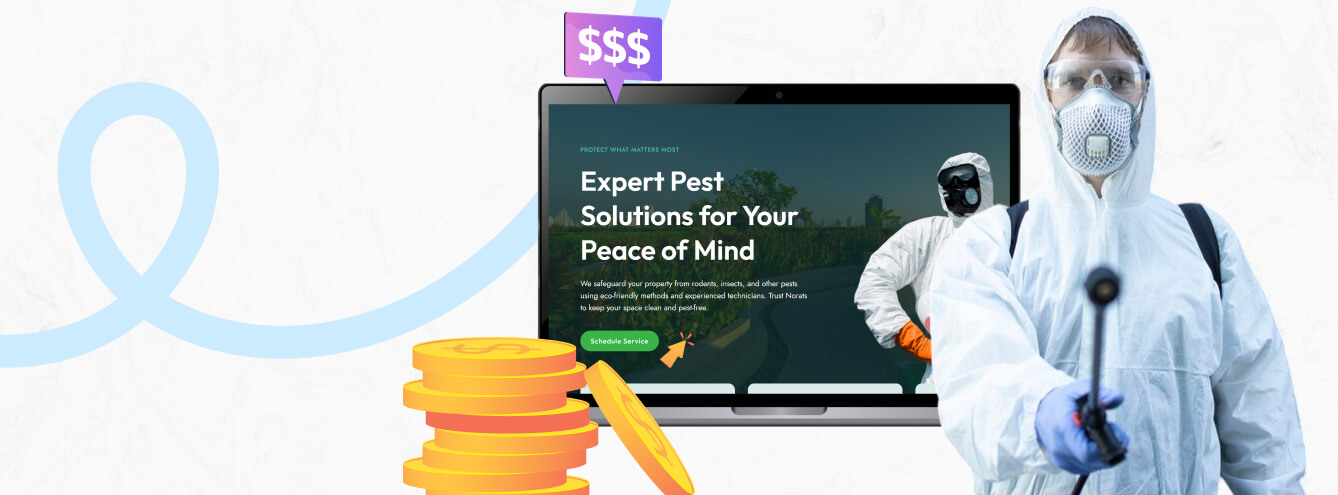
 15 min
15 min
In the pest treatment business, patience is not a virtue. When termites swarm a wooden frame or mice get into a warehouse, the clock starts to tick. Customers don't think about it for weeks; they just type, click, and call the first trustworthy company that says it can fix the problem quickly. At that time, being able to see is power. This is when PPC management for pest control companies stops being just a marketing line item and starts being a way to stay ahead of the competition.
PPC doesn't depend on luck like traditional advertising does. It catches demand at its highest point, putting businesses exactly where people are looking and when they need something right now. The lesson for digital marketing service providers is clear: in markets where speed is important, PPC is not optional; it is necessary. If done well, it doesn't only bring in traffic; it also gets high-intent customers at the exact moment they are ready to make a purchase.
Want Your Phones Ringing Every Day?
Customers don’t wait. With the right PPC management, your company becomes their first call. Share your details today and learn how to turn searches into steady jobs.
Get Started Now!
Why PPC is Important for Pest Control Services
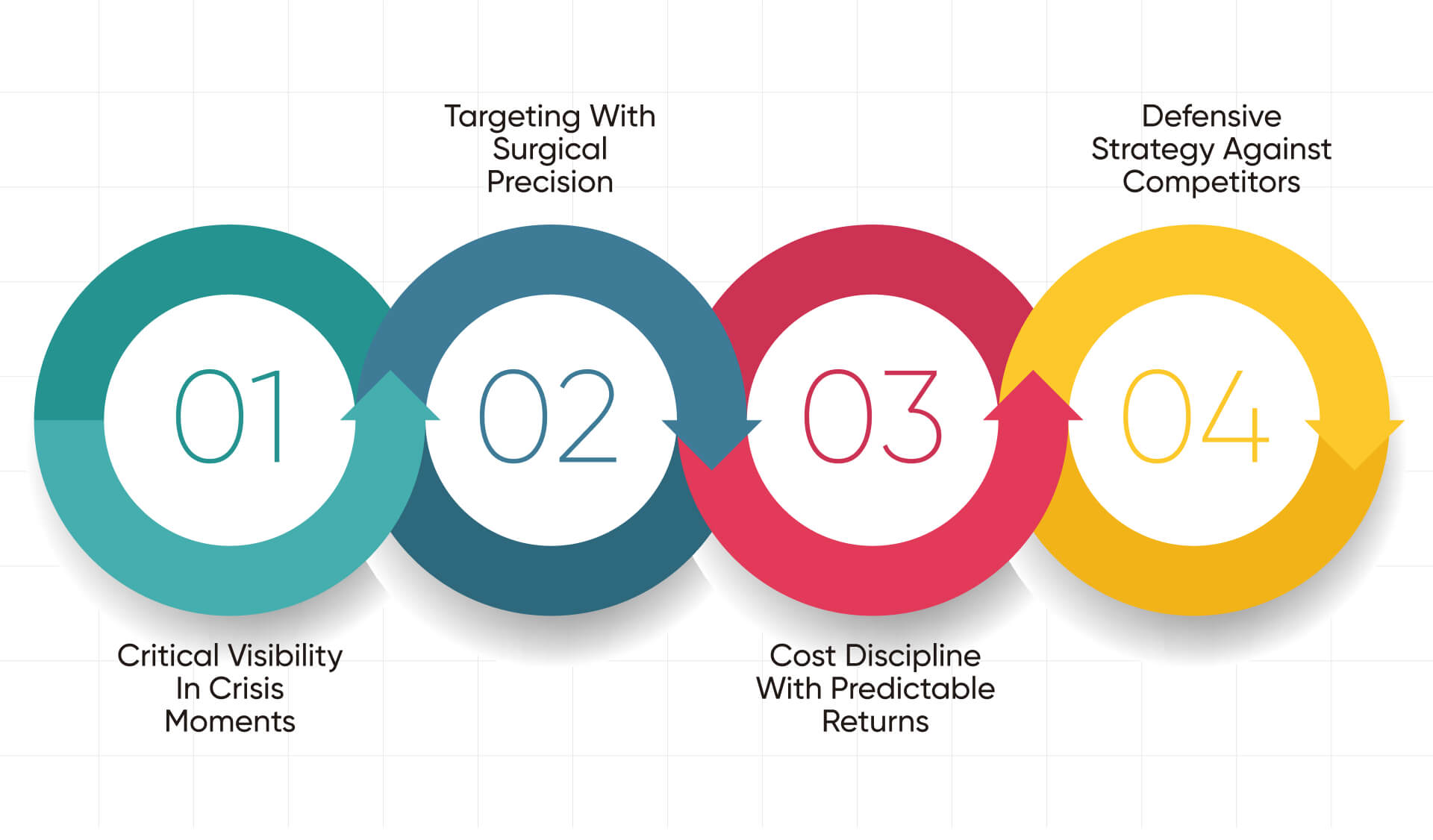
While pest control may seem local and transactional, its economics closely align with high-competition sectors, where the first to gain visibility often secures a hire. Search engines have replaced phone books, and with that shift, PPC has become the modern storefront.
1. Critical Visibility in Crisis Moments
Few consumers browse reviews when wasps are nesting in their attic. They click the first credible option that appears. PPC guarantees that your client is visible when it matters most.
2. Targeting with Surgical Precision
The strength of PPC lies in exclusion as much as inclusion. A well-run campaign shows ads only where a company can actually respond within its service area and to the customers it can realistically serve. Anything broader wastes money and time.
3. Cost Discipline with Predictable Returns
Most pest control firms work on tight margins. PPC makes it possible to put a cap on what you spend and see directly how much business it generates.
4. Defensive Strategy Against Competitors
Competitors are not waiting. They’re already bidding on “exterminator near me.” Without a well-managed PPC presence, pest control companies effectively cede market share by default. In an industry where urgency dictates action, ppc management for pest control companies ensures businesses are not spectators to demand; they are the first responders.
How PPC Helps Pest Control Businesses Capture More Customers
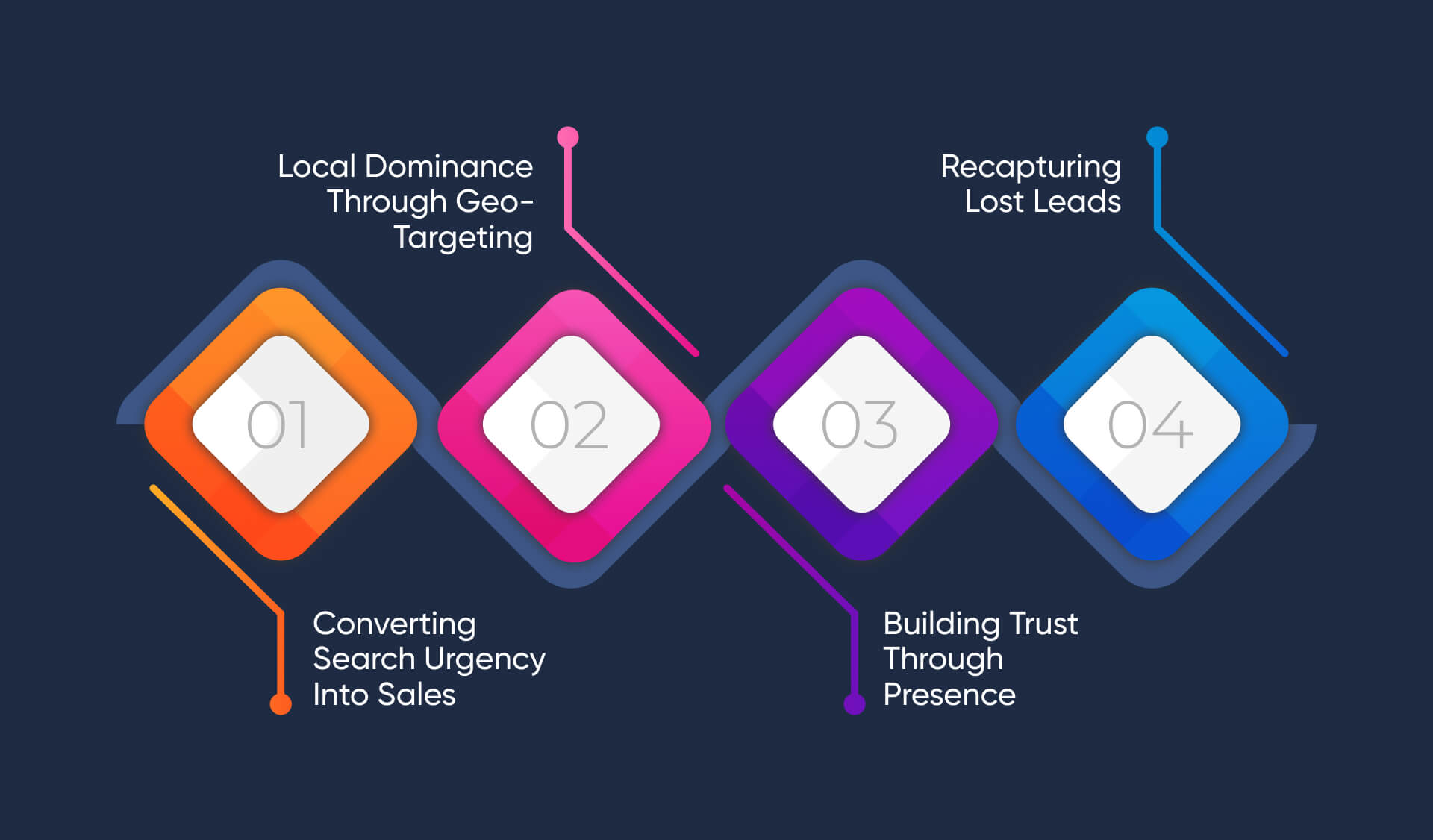
The strength of PPC is not simply visibility; it’s relevance. It doesn’t place a brand in front of everyone; it places it in front of the right someone at the right time.
Converting Search Urgency into Sales
A homeowner searching for “emergency termite treatment” is already sold on the service; they just need a provider. PPC steps in at the very moment a customer is ready to act, turning a late-night search into a phone call and, often, into a booked service within hours.
Local Dominance Through Geo-Targeting
A pest control company doesn’t need the whole map. It needs the streets it can actually drive to. Geo-targeting makes sure the ads stay inside those lines.
Building Trust Through Presence
Repeated exposure at the top of search results creates credibility. People tend to trust the names they see most often. If a company shows up again and again in search results, it sticks.
Recapturing Lost Leads
Not every visitor converts on first contact. Remarketing campaigns follow undecided customers, reminding them of the brand until the urgency resurfaces and the call is finally made.
PPC is not advertising in the conventional sense. It is a system designed to capture, convert, and re-engage high-value demand. That is why ppc management for pest control companies is less about promotion and more about owning the decisive moment of customer choice.
Losing Leads to Faster Competitors?
Visibility in urgent moments decides who wins the customer. Stop ceding market share. Submit the form now and explore a PPC plan that positions your brand first.
Claim Your Advantage!
Key PPC Services Every Pest Control Company Needs
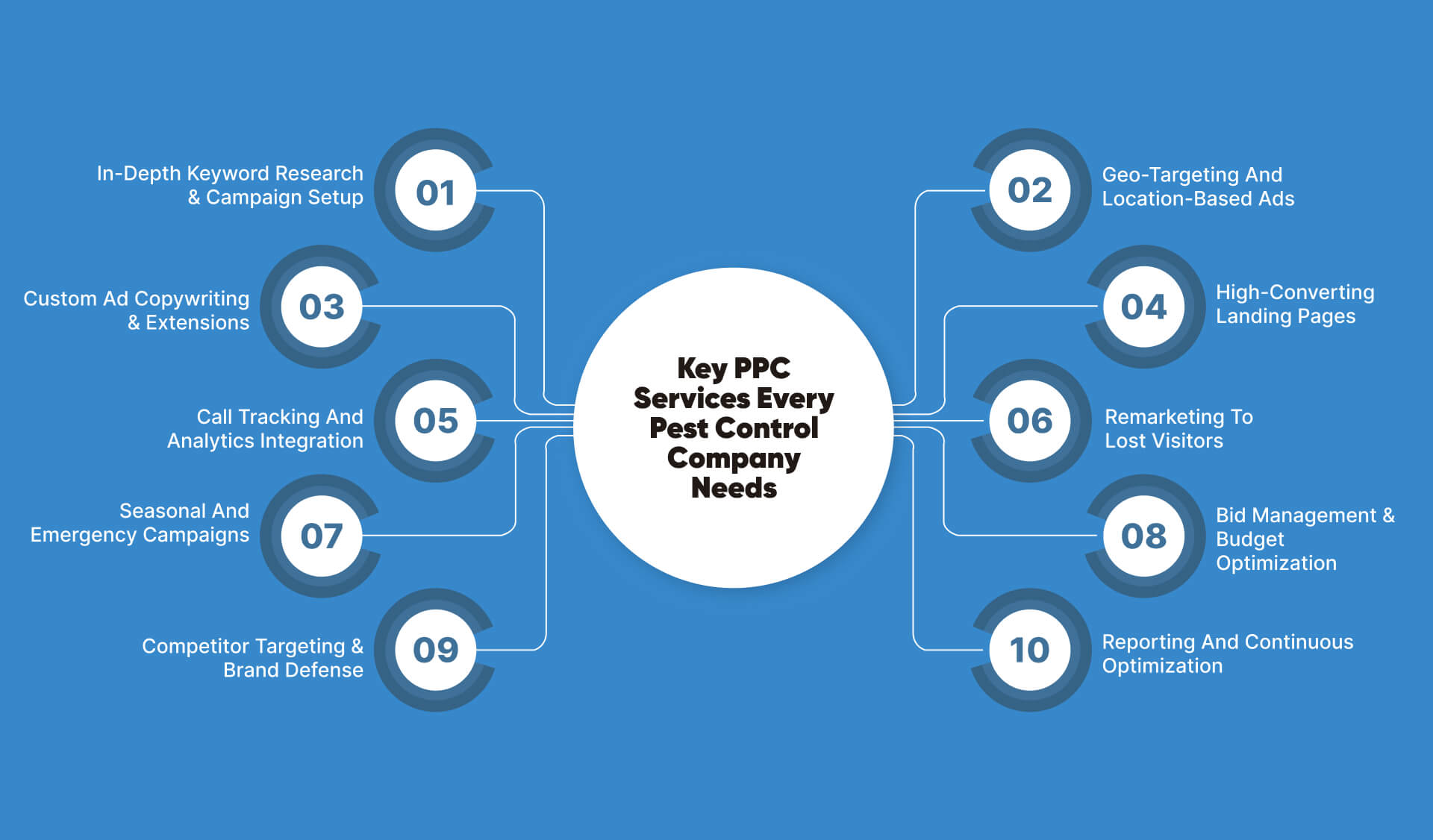
Digital advertising isn’t kind to shortcuts. Nowhere is this more apparent than in pest control, where urgency collides with competition. A homeowner with termites in their basement won’t scroll endlessly; they’ll call the first name that seems competent and local. For pest control firms, a one-size-fits-all ad won’t work. The campaigns have to be built around how their customers actually search and buy. Below are the essential pillars of ppc management for pest control companies, each one a lever that turns visibility into revenue.
In-Depth Keyword Research & Campaign Setup
Every campaign begins with words. In pest control, the wording matters. A homeowner searching “emergency cockroach removal” is ready to hire. Someone typing “best pest control products” probably isn’t. The job of keyword research is to tell those two apart and put money behind the search that leads to a call.
Campaign setup then transforms this data into structure: segmented ad groups, carefully matched queries, and budgets allocated where urgency is highest. A sloppy setup drains money; a precise one builds a pipeline of steady calls.
Geo-Targeting and Location-Based Ads
Pest control is local by nature. A company in Miami gains nothing from impressions in Dallas. Geo-targeting keeps ads inside the areas a company actually serves — right down to the neighborhoods or zip codes where crews can respond. More advanced strategies even weave location into the copy itself: “Trusted in Queens since 1995” or “Serving Denver families within 24 hours.” That kind of hyper-local framing doesn’t just cut waste; it makes the ad feel familiar, even neighborly.
Custom Ad Copywriting & Extensions
An ad’s headline is often the only chance to win a customer’s attention. Good copy doesn’t describe; it persuades. Most people calling a pest control company want three things: someone who can come quickly, someone who won’t put their family at risk, and someone they can trust to do the job right. Ads that promise same-day visits, safe treatments, or licensed technicians speak directly to those worries.
Extensions extend that persuasion. A click-to-call button removes friction. Sitelinks to “Termite Control” or “Bed Bug Removal” guide prospects directly to their problem. Each extension is an additional invitation, and together they transform a static ad into an active pitch.
High-Converting Landing Pages
The journey doesn’t end with a click. Too many pest control companies lose leads because ads dump users onto cluttered homepages. A high-performing campaign delivers visitors to landing pages engineered for conversion.
A good landing page doesn’t try to do everything. It loads quickly on a phone, makes it obvious how to reach the company, and shows proof that the business is legitimate whether that’s a license, a certification, or even a photo of the technician who might show up at the door. One clear “Call Now” button is usually enough. In industries where customers decide in minutes, friction kills; simplicity converts.
Call Tracking and Analytics Integration
Most pest control customers still prefer to call instead of filling out an online form. Without call tracking, there’s no way to see which ads actually brought in the business. Analytics fixes that. It connects a click to a call and a call to a booked job.
For agencies handling ppc management for pest control companies, this kind of tracking is essential. It doesn’t just show whether the budget is working it makes clear which keywords and campaigns generate real customers and which ones quietly waste money. That’s what allows managers to shift spending to where it matters most.
Remarketing to Lost Visitors
Not all prospects convert at first sight. A homeowner may browse three companies before deciding who to call. Remarketing ensures they don’t forget you. By showing ads after a visitor leaves, pest control firms stay top-of-mind until the urgency resurfaces.
This strategy transforms indecision into eventual conversion, making the difference between being the company remembered or the one replaced.
Seasonal and Emergency Campaigns
Pests move with the seasons. Pests don’t show up on a fixed schedule. Ants are a bigger problem in the heat, while rodents move in when the weather turns cold. A smart PPC campaign tracks those shifts and adjusts before the calls start flooding in. The same goes for sudden outbreaks; ads can be turned on within hours to meet the demand. For pest control companies, staying in step with those cycles isn’t optional. It’s how the business works.
Bid Management & Budget Optimization
PPC spending can get out of hand quickly if no one is watching. Bid management keeps costs under control by cutting back on clicks that don’t turn into customers and pushing more weight behind the ones that do. Spending can be adjusted by time of day, by device, or by how a campaign is actually performing.
For teams running ppc management for pest control companies, the goal isn’t to spend more but to spend smarter shifting money away from keywords that never bring calls and into the ones that reliably do.
Competitor Targeting & Brand Defense
In competitive markets, rivals won’t hesitate to bid on your brand name. Without defense campaigns, a homeowner searching “ABC Pest Control” might click on “XYZ Pest Control” instead. Protecting your own brand terms is not optional; it’s survival.
Equally, competitor targeting allows companies to capture market share by appearing directly alongside rivals. Done with precision, it’s not sabotage; it’s smart positioning.
Reporting and Continuous Optimization
PPC campaigns can’t run on autopilot. The numbers that matter aren’t clicks or impressions; they’re how many people actually picked up the phone and became customers. Good reporting makes that clear, and steady adjustments keep the ads from going stale.
Markets change, competitors adapt, and algorithms shift. PPC that stands still quickly falls behind.
Which Social Media Platforms Matter for Pest Control PPC
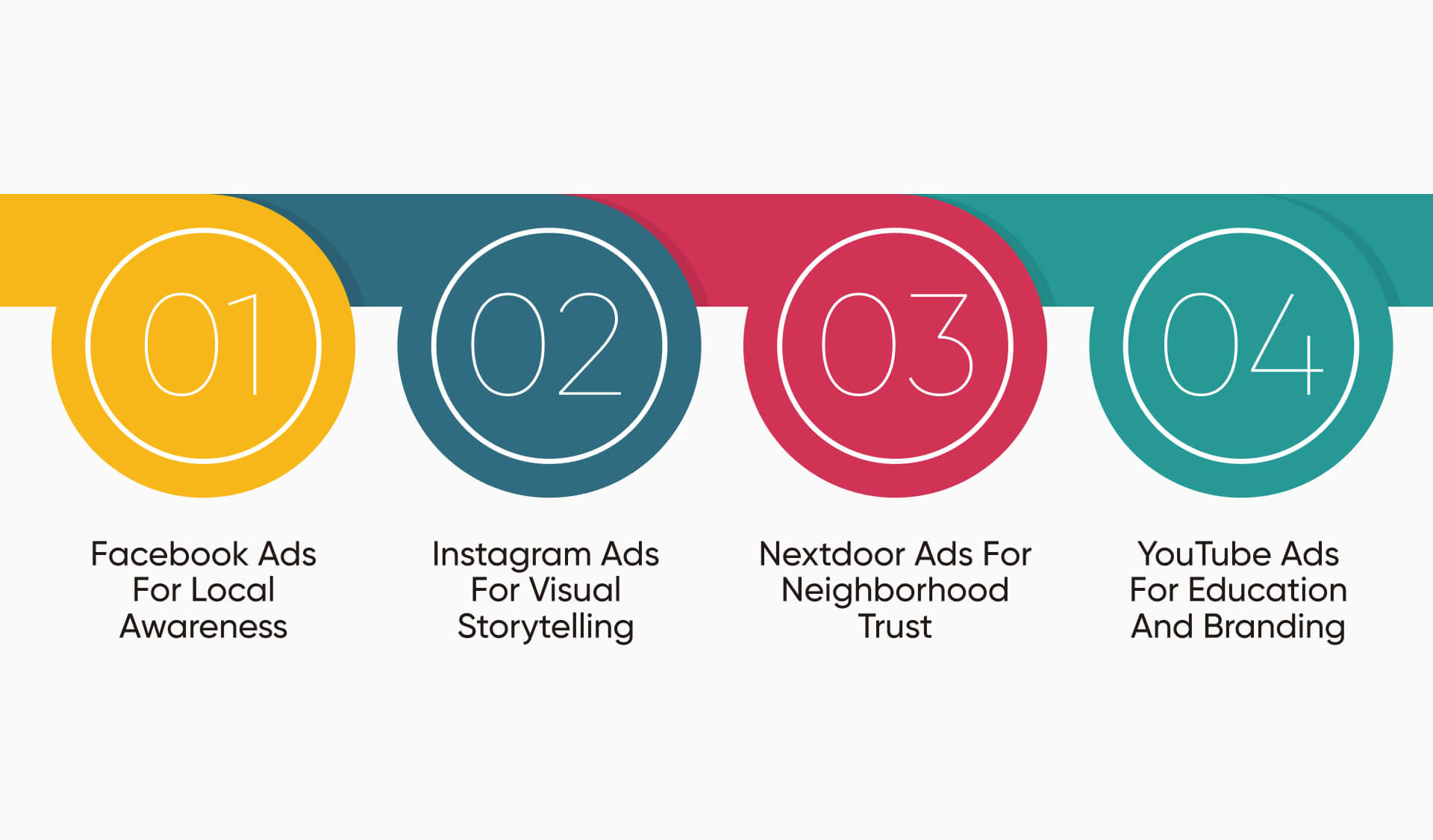
Search engines catch people who are ready to buy. Social media, on the other hand, shapes how people think about a company before that moment. In pest control, where trust often tips the decision, these platforms extend the reach of ppc management for pest control companies.
Facebook Ads for Local Awareness
Facebook is still the most useful social channel for pest control firms. Its targeting lets ads show up in the right neighborhoods, and posts shared in local groups often carry more weight than paid space on a billboard. A short testimonial, placed in the feed where neighbors already trade advice, can do more than a polished brand ad.
Instagram Ads for Visual Storytelling
Pest control doesn’t seem like a visual business, but Instagram makes it work. Photos showing “before and after” results, short clips of treatments, or simple graphics explaining seasonal pest problems give a company a chance to stand out. With the right targeting, these ads build familiarity with younger homeowners scrolling through their feeds.
Nextdoor Ads for Neighborhood Trust
Nextdoor is built for conversations among neighbors, which makes it unusually effective for local services. An ad here doesn’t feel like a broadcast; it lands in the same feed where people are already recommending contractors and service providers. This context facilitates the perception of a pest control company as a reliable option.
YouTube Ads for Education and Branding
Video gives companies space to explain what they do in plain terms. A short clip showing the signs of termite damage or how to spot a rodent problem teaches something useful and, at the same time, leaves viewers with a clear idea of who to call if the problem shows up at home. For agencies offering ppc management for pest control companies, YouTube is a chance to combine education with branding in one place.
How Do You Turn Clicks Into Real Calls?
Clicks alone won’t pay the bills. Strong PPC connects directly to booked appointments. Share your information today and we’ll show how to bridge clicks into customers.
See How It Works!
Benefits of Professional PPC Management for Pest Control Companies
- Owners can spend their time running crews and dealing with customers, not learning how to manage ad dashboards.
- Specialists bring experience. They know which campaigns tend to work and which ones usually waste money.
- With someone watching the numbers, the flow of calls becomes steadier instead of hit-or-miss.
- Campaigns can be scaled up into new neighborhoods and new services without starting over.
- Competitors are already bidding for the same customers. A managed campaign helps a company keep its place in front of them.
For most firms, paying for PPC management isn’t just another cost. It’s what keeps the phones ringing.
Cost of PPC for Pest Control Companies
Budgets vary. A small pest control firm might spend $1,500 to $3,000 a month. Bigger operators in crowded cities can pay well over $5,000. Clicks for high-intent searches like “emergency termite control” often cost between $10 and $25.
But the number on the invoice isn’t the whole story. A $2,000 campaign that brings in $20,000 of work isn’t a cost; it’s a return. And for companies using ppc management for pest control companies, the bigger risk isn’t what they spend; it’s not showing up at all while a competitor takes the customer.
Common PPC Mistakes Pest Control Companies Should Avoid
Casting too wide a net: Running ads outside the areas a company actually serves burns through money without bringing real leads.
- Skipping negative keywords: Without them, ads show up for searches like “DIY pest control,” which rarely turn into customers.
- Sending clicks to the wrong page: A cluttered homepage isn’t built to convert. Visitors should land on a page that makes it easy to call or book.
- Forgetting mobile users: Most searches happen on phones. If the site is slow or hard to use, customers drop off.
- Walking away after setup: PPC needs regular checks. Campaigns left on autopilot usually start wasting budget within weeks.
For companies investing in ppc management for pest control companies, avoiding mistakes matters as much as getting the basics right. In this business, customers make decisions fast, and a single misstep can send them to a competitor.
Want Proof Your Ads Drive Real Jobs?
Without call tracking, it’s guesswork. We connect ads to booked services, so you see returns in real numbers. Fill out the form for a clarity-driven consultation.
Get Proof Today!
PPC and SEO: Which Should Pest Control Companies Rely On?
In pest control, PPC carries the heavier weight. Customers don’t browse for weeks they search and call within minutes of spotting a problem. According to industry studies, over 70% of local service buyers click a paid ad before choosing a provider, and in categories like pest control, more than 60% of calls from PPC ads happen within 24 hours of the search. That immediacy is hard to ignore.
SEO still matters. Ranking organically for “pest control near me” builds credibility and lowers cost per lead over time. But it is slow: most small businesses wait six to twelve months before seeing meaningful gains in organic search. For a pest control operator, that delay could mean a year of missed opportunities.
That’s why most firms start with ppc management for pest control companies. It buys visibility today, fuels the pipeline with measurable leads, and keeps the schedule full. SEO should run in the background, but in this industry, PPC is the engine that keeps the trucks moving and the business alive.
How Edifying Voyages Helps Pest Control Companies Succeed with PPC
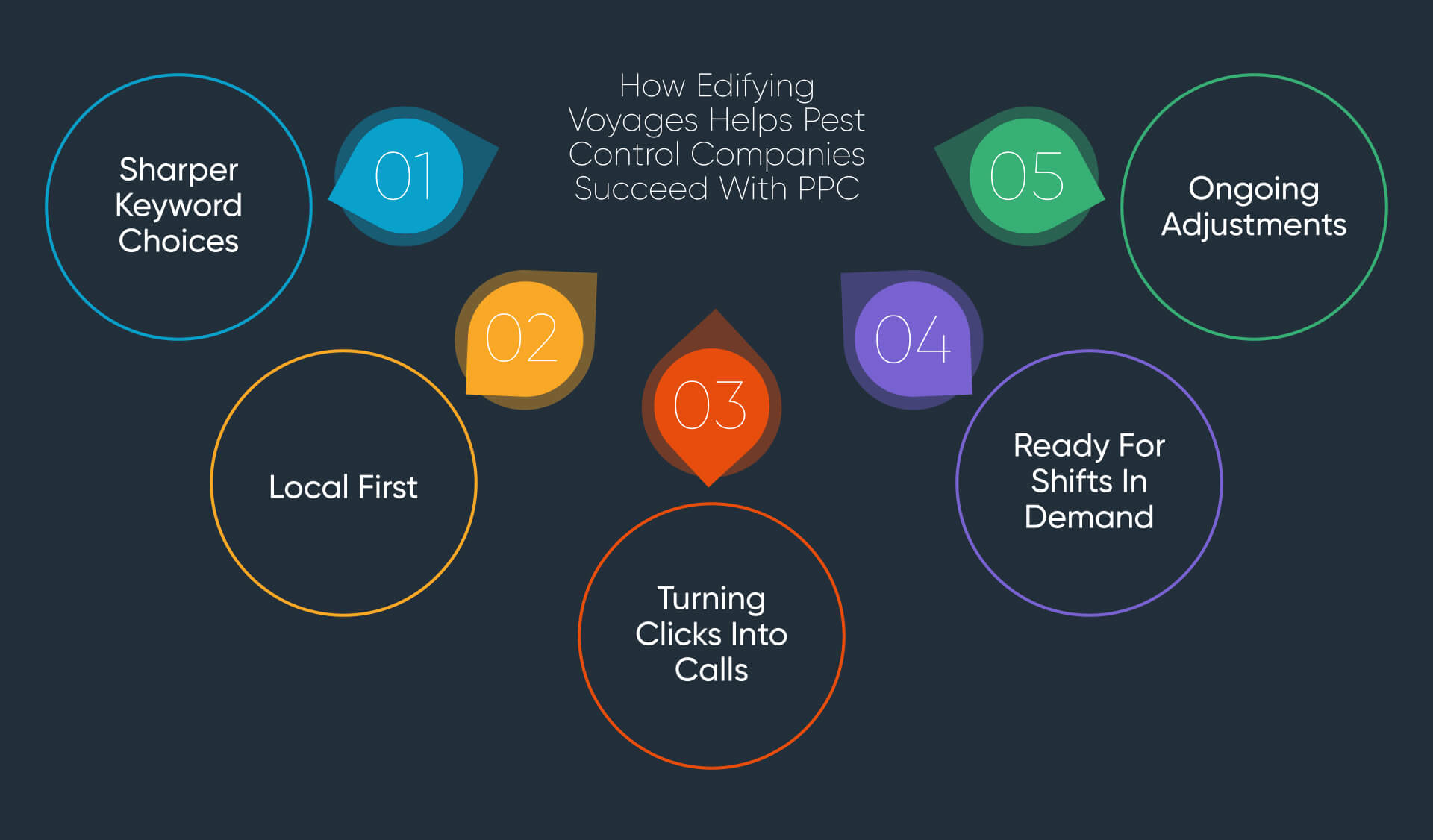
Running PPC in pest control isn’t difficult because the tools are complicated. It’s difficult because there’s little room for error. A poorly set campaign doesn’t just waste a budget it hands the lead to a competitor.
That’s where Edifying Voyages steps in.
Sharper Keyword Choices
The search terms matter. Someone looking for “emergency termite removal” is a potential customer; someone looking for “DIY bug spray” is not. We design campaigns that tell those apart so money only goes toward searches that bring real business.
Local First
Pest control isn’t a statewide service. It’s neighborhood by neighborhood. We build campaigns that match that reality, making sure ads only appear where a company can actually send a truck.
Turning Clicks into Calls
A click on its own has no value. We connect ads to landing pages and call systems built to turn interest into appointments, because in this industry, the phone call is the conversion.
Ready for Shifts in Demand
Pests change with the season. Mosquitoes in July, rodents in December. We adjust campaigns to match those patterns, so companies are visible before the phones start ringing.
Ongoing Adjustments
PPC isn’t something you set up once and leave alone. Campaigns change with the season, with competitors, and with customer behavior. The only way to keep them effective is to check the numbers regularly, adjust bids, test new ads, and move budget into what’s actually producing calls. For agencies handling ppc management for pest control companies, this steady upkeep is what keeps results consistent and costs under control.
At Edifying Voyages, PPC isn’t treated like a one-off campaign. It’s built as a system, one that keeps a pest control company visible when customers are making urgent decisions. In a business defined by speed, that visibility often decides who gets the call.
Why Leave Calls to Competitors?
In pest control, speed wins. Professional PPC ensures your company is seen before rivals. Provide your details now to start converting urgent searches into immediate customer calls.
Start Converting Today!
Conclusion
Pest control is a business where timing decides everything. When termites show up in the rafters or mice cross the kitchen floor, homeowners don’t shop around for weeks. They look for the first company that seems reliable and can act fast.
That’s why ppc management for pest control companies matters. It puts a business in front of customers at the exact moment they’re ready to pick up the phone. And unlike old forms of advertising, it leaves a record. You can see which clicks turned into calls and which calls became paying jobs.
PPC will bring in calls quickly, but it can’t carry growth on its own. Over time, a company also needs to show up in organic search. The firms that last usually invest in both, often starting with an affordable ppc services that delivers steady results while SEO builds in the background.
At Edifying Voyages, we build PPC programs as systems, not one-off campaigns. The aim is simple: keep pest control businesses visible when decisions are made. In this industry, the companies that win aren’t the ones waiting for calls. They’re the ones making sure the calls never stop.
FAQs
Budgets vary by market size and competition. Smaller firms often spend $1,500 to $3,000 a month, while larger operators in dense cities may invest $5,000 or more. The key is not the amount but tracking whether every dollar generates calls and bookings.
Pest problems create urgency customers search and call the same day. PPC puts your company at the top of those searches, exactly when buyers are ready to act. That timing makes it one of the fastest ways to win new jobs.
Yes. PPC delivers instant visibility, but SEO builds long-term stability. Ranking organically lowers the cost per lead over time, so most successful pest control firms use both together instead of relying on just one.
Pest control work is local. Geo-targeting makes sure ads only show up in the neighborhoods a company can actually serve. It stops money from being spent on clicks that could never turn into jobs.
Absolutely. Seasonal campaigns are one of the strengths of PPC. Ads can be shifted to focus on mosquitoes in summer or rodents in winter, ensuring your company shows up when demand is highest.
Running PPC well takes constant tracking and adjustment. Most pest control owners don’t have the time to test keywords, shift budgets, or watch performance week after week. Hiring a team that handles PPC management for pest control companies means the work is done right and the money isn’t wasted.




